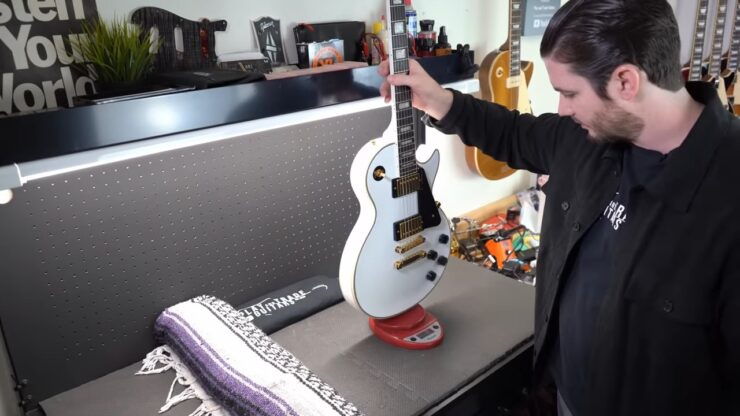How Much Does An Epiphone Les Paul Custom Weigh? Answered If you’ve ever dreamed of owning an Epiphone Les Paul Custom guitar, you’re not alone. As one of the most popular instruments in the world, these iconic guitars have been played by countless musicians in various genres. However, before you take the plunge, there’s one crucial question you might be asking yourself: how much does an Epiphone Les Paul Custom weigh?
In this comprehensive blog post, we’ll explore the factors that contribute to the weight of an Epiphone Les Paul Custom, why it matters, and how to select the perfect guitar for you. So, whether you’re a beginner or an experienced player, sit back and enjoy the ride as we delve into the fascinating world of Epiphone Les Paul Custom guitars.
What Determines the Weight?
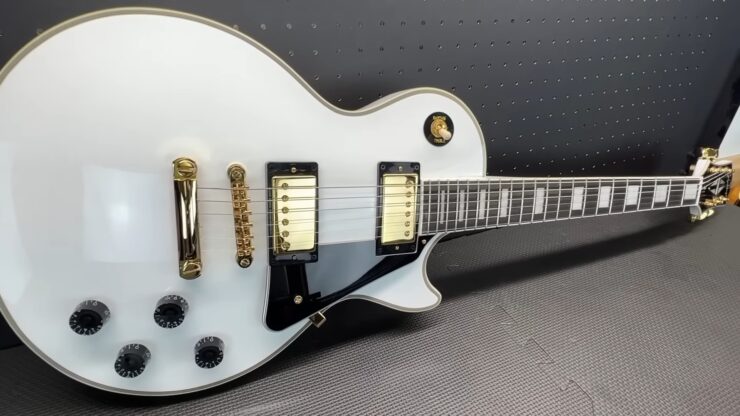
The weight of an Epiphone Les Paul Custom is determined by various factors, including the materials used, construction method, and hardware components. Understanding these elements is crucial for guitarists seeking the perfect balance between comfort and tone.
Materials
The weight of an Epiphone Les Paul Custom is primarily determined by the materials used in its construction. The most significant component is the body, which is typically made of mahogany. Mahogany is a dense hardwood that contributes to the guitar’s signature sustain and warmth, but it can also make the instrument quite heavy. The neck of the guitar is usually also made of mahogany, with a fingerboard made of either rosewood, ebony, or another hardwood. These materials add to the overall weight of the guitar, but they also help to provide balance and ensure that the instrument resonates properly.
Construction
Another factor that affects the weight of an Epiphone Les Paul Custom is the construction method used. Most Epiphone Les Paul Customs are built with a set-neck construction, meaning that the neck is glued to the body. This type of construction can contribute to the guitar’s overall weight but is considered essential for achieving the classic Les Paul sound.
Hardware
The hardware on an Epiphone Les Paul Custom can also impact the guitar’s weight. The pickups, bridge, tailpiece, and tuning machines are all made of metal, which adds to the instrument’s mass. Some models may also feature additional hardware, such as a pickguard or binding, which can further increase the guitar’s weight.
Why Does the Weight Matter?
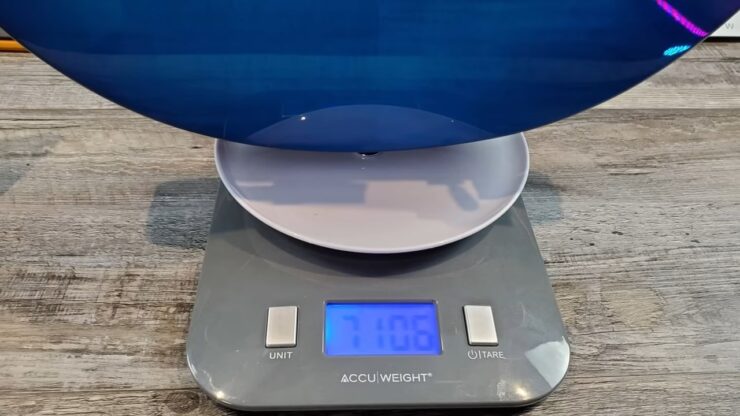
When considering a guitar, the weight becomes an essential factor that affects both the player’s comfort and the instrument’s sound. From playability to tonal qualities, understanding the impact of weight is crucial for guitarists seeking their ideal instrument.
Comfort and Playability
The weight of a guitar can have a significant impact on a player’s comfort and playability, especially during long practice sessions or performances. A heavy guitar can cause strain on the neck, shoulders, and back, which can lead to discomfort or even injury over time. On the other hand, a lighter guitar may be more comfortable to play but may not offer the same tonal qualities and sustain as a heavier instrument.
Sound and Tone
The weight of an Epiphone Les Paul Custom can also influence the guitar’s sound and tone. As mentioned earlier, the density of the mahogany body and neck contribute to the guitar’s characteristic warmth and sustain. However, this comes at the cost of increased weight. A lighter guitar might not have the same tonal depth, but it may be more responsive and easier to handle during fast passages or intricate playing techniques.
The Typical Weight
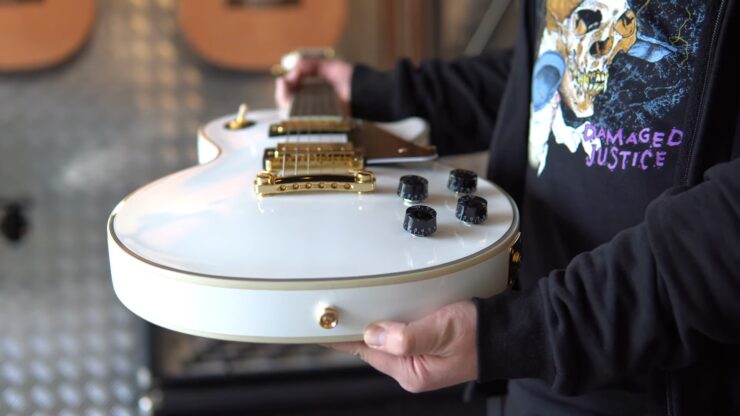
Determining the weight of an Epiphone Les Paul Custom is crucial for musicians seeking their ideal instrument.
Average Weight
After extensive research and gathering data from various sources, we can confidently say that the average weight of an Epiphone Les Paul Custom falls between 9 and 12 pounds (4.1 to 5.4 kilograms). This range takes into consideration the various factors that contribute to the weight of the guitar, such as materials, construction, and hardware.
Variations and Exceptions
It’s important to note that the weight of an Epiphone Les Paul Custom can vary from one instrument to another, even within the same model. Factors such as the specific piece of wood used or slight differences in hardware can lead to variations in weight. Furthermore, Epiphone occasionally releases special edition or limited-run models with unique features, which can impact the guitar’s weight. Consequently, it’s always a good idea to try out a specific guitar in person to get a feel for its weight and balance.
How to Determine the Authenticity
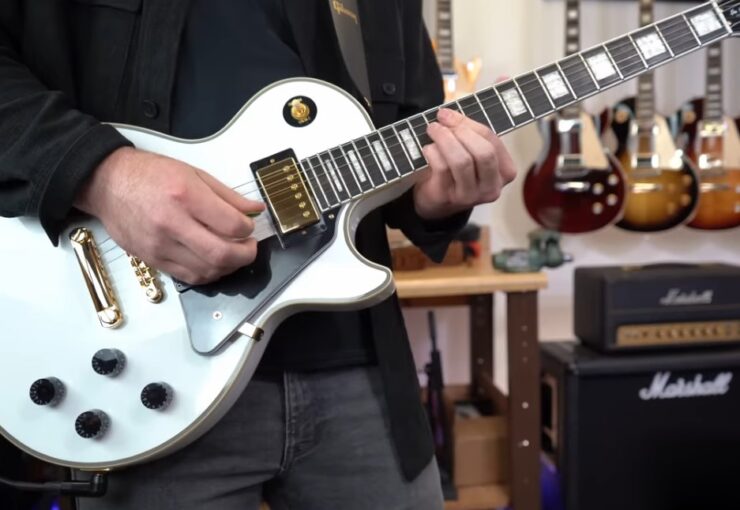
They are highly sought after by guitarists, and it’s essential to ensure that you’re purchasing an authentic instrument. Here are some tips on how to determine the authenticity of an Epiphone Les Paul Custom:
- Check the serial number: Each Epiphone Les Paul Custom guitar has a unique serial number that can be checked against the official Epiphone database. This can help verify the authenticity of the guitar.
- Look for the “Epiphone” logo: The Epiphone logo should be clearly visible on the headstock of the guitar. Check for any misspellings or inconsistencies in the logo. Examine the hardware: The hardware on an authentic Epiphone Les Paul Custom should be high-quality and free of defects. Check for any signs of wear and tear or rust on the hardware.
- Inspect the finish: The finish on an authentic Epiphone Les Paul Custom should be smooth and evenly applied. Any signs of bubbling, cracking, or peeling may indicate a counterfeit instrument.
- Check the weight: The weight of an authentic Epiphone Les Paul Custom should be consistent with other guitars of the same model. If it feels unusually heavy or light, it may be a fake.
- Get a second opinion: If you’re still unsure about the authenticity of the guitar, consider taking it to a reputable guitar shop or expert for a professional opinion.
How to Choose the Right Epiphone Les Paul Custom for You
Choosing the right Epiphone Les Paul Custom guitar involves considering factors such as comfort, playing style, and personal preferences. By exploring various models and testing them out, you can find the perfect match that suits your needs and enhances your musical experience.
Test it Out
When choosing an Epiphone Les Paul Custom, the best advice is to try out several different guitars to find the one that feels most comfortable to you. This will allow you to get a sense of how the weight and balance of the guitar affect your playing and whether a heavier or lighter instrument is better suited to your needs.
Consider Your Playing Style
Your playing style and the type of music you perform should also play a role in your choice of guitar. If you’re primarily a rhythm player or you frequently perform in genres that require a warm, full-bodied tone, a heavier Epiphone Les Paul Custom might be a better fit for you. On the other hand, if you’re a lead guitarist or you play music that demands quick, agile playing techniques, a lighter guitar may be more suitable.
Factor in Your Physical Comfort
Physical comfort is an essential aspect to consider when choosing a guitar. If you have a smaller frame or struggle with back or neck issues, a lighter Epiphone Les Paul Custom might be the better option for you. If, on the other hand, you’re comfortable with a heavier instrument and prioritize tonal depth and sustain a heavier guitar could be the right choice.
How to Care for Your Epiphone Les Paul Custom
Caring for your Epiphone Les Paul Custom is important to ensure that it stays in top condition and retains its value over time. Here are some tips on how to care for your Epiphone Les Paul Custom:
- Keep it clean: Regularly clean the guitar with a soft, dry cloth to remove dust and grime. Avoid using harsh cleaning products that can damage the finish or hardware.
- Store it properly: Store your guitar in a cool, dry place away from direct sunlight and humidity. Consider using a guitar case or stand to protect it from scratches and other damage.
- Change the strings regularly: Strings can become worn or corroded over time, affecting the tone and playability of the guitar. Consider changing the strings every few months, or more frequently if you play frequently.
- Adjust the truss rod: The truss rod helps maintain the guitar’s neck alignment and should be adjusted periodically. Consider taking your guitar to a professional for truss rod adjustments.
- Check the hardware: Regularly check the hardware, including the tuners, bridge, and pickups, for any signs of wear and tear. Consider replacing any worn or damaged hardware to maintain the guitar’s performance.
- Keep it tuned: Keep your guitar in tune to ensure that it sounds its best. Consider investing in a quality tuner to help you keep the guitar in tune.
Alternative Options
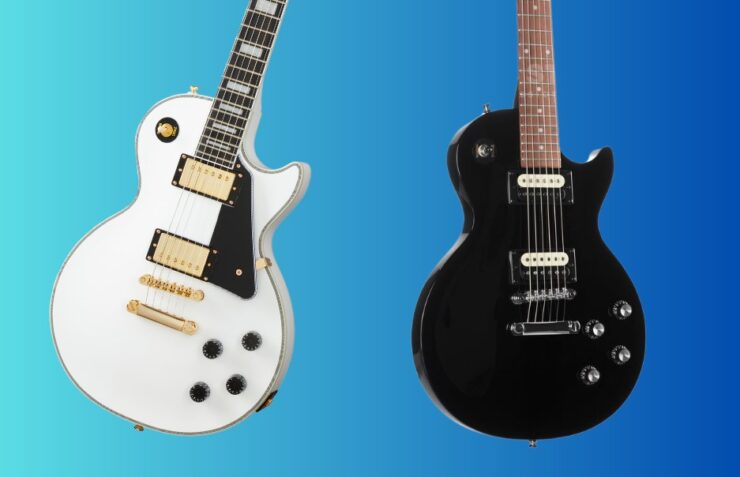
For guitar enthusiasts seeking alternative options to the traditional Les Paul models, Epiphone offers lightweight solutions without compromising on tone.
Epiphone Les Paul Custom Lite
If you love the look and sound of an Epiphone Les Paul Custom but are concerned about the weight, the Epiphone Les Paul Custom Lite might be the perfect solution. This model features a thinner body and chambered construction, which reduces the overall weight of the guitar without sacrificing its signature tone. The Custom Lite typically weighs between 7 and 8 pounds (3.2 to 3.6 kilograms), making it a more comfortable option for those who prefer a lighter guitar.
Epiphone Les Paul Studio LT
Another alternative is the Epiphone Les Paul Studio LT, which is designed as a more affordable and lighter-weight option for players who love the Les Paul style. While it doesn’t have all the aesthetic features of a Custom model, the Studio LT still provides the classic Les Paul tone and playability at a more accessible price point. This model typically weighs between 8 and 9 pounds (3.6 to 4.1 kilograms).
FAQs
Are all Epiphone Les Paul Custom guitars made from mahogany?
While most of them feature a mahogany body and neck, there can be exceptions or limited edition models that use other materials. Always check the specifications of a specific guitar to ensure you know what materials are used in its construction.
Do different finishes affect the weight of an Epiphone Les Paul Custom?
The finish on it can have a minimal impact on its overall weight, but the difference is usually negligible. The primary factors that contribute to the guitar’s weight are the materials, construction, and hardware.
Are there Epiphone Les Paul Custom models with chambered bodies?
Yes, the Lite features a chambered body, which reduces the overall weight of the guitar without sacrificing its signature tone.
How much does an Epiphone Les Paul Custom Lite weigh?
It typically weighs between 7 and 8 pounds (3.2 to 3.6 kilograms), making it a more comfortable option for those who prefer a lighter guitar.
How much does an Epiphone Les Paul Studio LT weigh?
It typically weighs between 8 and 9 pounds (3.6 to 4.1 kilograms). This model is designed as a more affordable and lighter-weight option for players who love the Les Paul style.
Do different Epiphone Les Paul Custom models have different weights?
Yes, the weight of an Epiphone Les Paul Custom can vary between models due to factors like materials, construction, and hardware. Additionally, limited edition or special edition models may have unique features that can impact the guitar’s weight.
Can I modify an Epiphone Les Paul Custom to make it lighter?
While it is possible to make modifications to a guitar to reduce its weight, such as changing the hardware or adding a chambered body, these alterations can be complex and may affect the instrument’s tone and structural integrity. It is usually best to consult with a professional luthier before attempting any significant modifications.
Conclusion
In summary, the weight of an Epiphone Les Paul Custom can vary depending on several factors, including the materials used, construction method, and hardware. On average, these guitars weigh between 9 and 12 pounds (4.1 to 5.4 kilograms). When choosing the right Epiphone Les Paul Custom for you, it’s essential to consider your playing style, physical comfort, and the specific sound and tone you’re looking for. By trying out different guitars and weighing your options, you’ll be well on your way to finding the perfect Epiphone Les Paul Custom that suits your needs and makes your music come alive.

